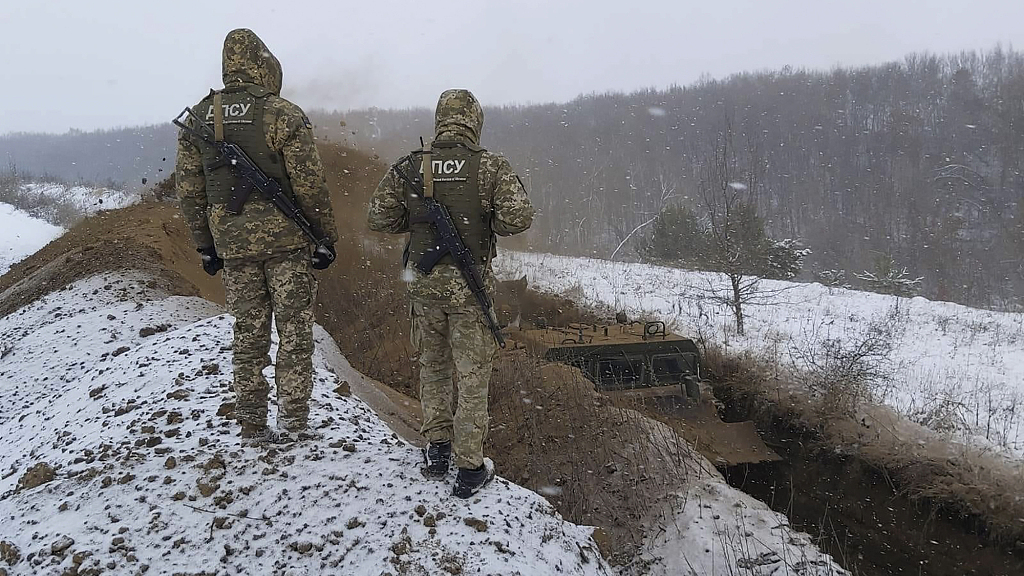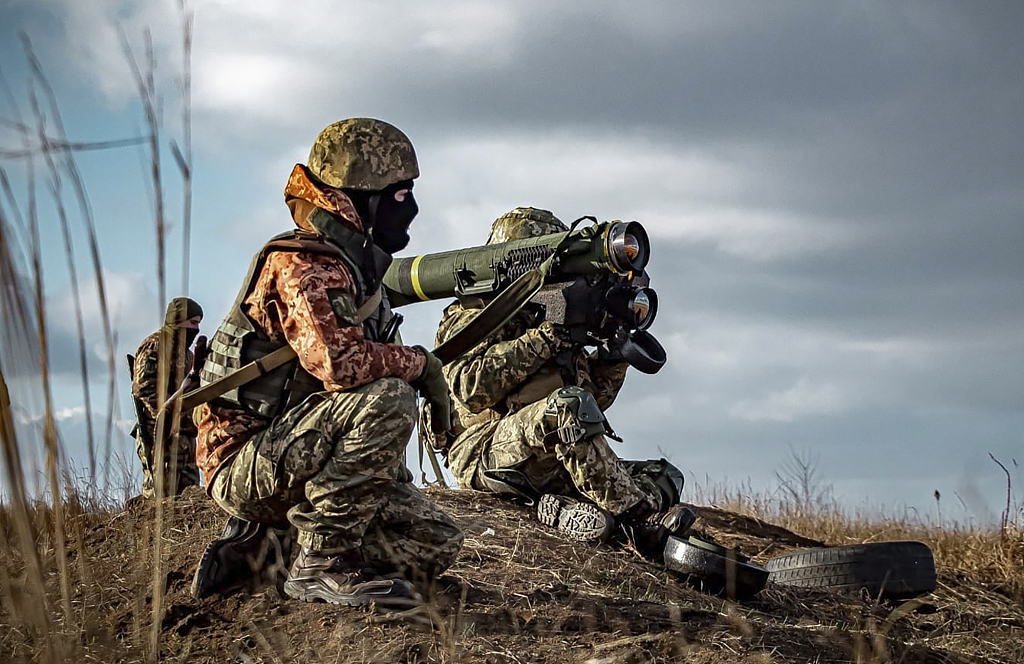
Ukrainian border guards watch as a special vehicle digs a trench on the Ukraine-Russia border close to Sumy, Ukraine, December 21, 2021./CFP
Ukrainian border guards watch as a special vehicle digs a trench on the Ukraine-Russia border close to Sumy, Ukraine, December 21, 2021./CFP
Editor's note: Nikola Mikovic is a freelance journalist based in Serbia. He covers mostly Russian, Ukrainian and Belarusian foreign policies, and writes for multiple web magazines. The article reflects the author's opinions, and not necessarily those of CGTN.
Russia and the U.S. will not engage in direct military confrontations any time soon, if at all. Instead, Moscow and Washington are expected to hold another round of talks on "strategic stability" that includes security guarantees the Russian Federation demands from NATO.
"The West should give security guarantees to Russia immediately and now, and not demand them from us," said Russian President Vladimir Putin at his annual end-of-year press conference Thursday in Moscow.
The event was held at a time of high tensions between the Kremlin and the West, with Russia allegedly massing forces near its border with Ukraine. Although Western leaders accuse Moscow of planning to invade the Eastern European country, Putin says that "the ball is in the Western court."
"What the U.S. is doing in Ukraine is at our doorstep. They need to understand that we simply have nowhere else to go. Do they think we're going to stand by and watch," Putin stressed on December 21, a couple of days before his annual media conference.
In the West such a statement was interpreted as Russia's readiness to wage a war against Ukraine in order to prevent the former Soviet republic from joining NATO. Although the Kremlin's rhetoric is more radical than in the past, Russian officials still leave room for negotiations with the U.S. New direct talks between the two countries' leaders are expected to take place early next year, although NATO already de facto ruled out any compromise over "key principles" of the alliance. In other words, it is not very probable that NATO will provide guarantees to Russia that former Soviet republics, including Ukraine, will not join the U.S.-led alliance. That, however, does not necessarily mean that Russia will invade the neighboring country.
Wars are expensive. At the time of a global economic and energy crisis, it is rather questionable if Moscow is interested in starting a war, especially since the Kremlin is quite aware that any military incursion into Ukraine would result in severe anti-Russian sanctions. On the other hand, Russia seems determined to protect eastern Ukraine's Donbass region in case Kiev launches a large-scale military offensive. Putin accused Ukrainian authorities of planning a military incursion against pro-Russia forces in the Donbass, pointing out that Kiev uses the threat of Russian invasion as a distraction.
"One gets the impression that a third military operation is being prepared in Ukraine and they are warning us – do not interfere. We must somehow react to this," Putin stressed.

A Ukrainian soldier is preparing to launch a U.S. Javelin missile during military exercises in Donetsk region, east Ukraine, December 23, 2021. /CFP
A Ukrainian soldier is preparing to launch a U.S. Javelin missile during military exercises in Donetsk region, east Ukraine, December 23, 2021. /CFP
It remains uncertain how Russia would react. In case it provides open and direct military support to the self-proclaimed Donbass republics, Moscow risks facing painful sanctions that would have a serious impact on the Russian economy, especially if the West bans Russia from SWIFT international payment system used by banks around the world.
If, however, Russia does not intervene, its Western partners will probably see such an inaction as a sign of weakness. Thus, from the Kremlin's perspective, preserving the status quo in the Donbass seems to be a priority, but Ukraine and NATO seem to have different plans. Still, in spite of apocalyptic announcements of a war between Russia and Ukraine, any conflicts are very unlikely to happen, at least until after the new round of talks between Moscow and Washington.
Meanwhile, Russia and the West will keep accusing each other of orchestrating an energy crisis in Europe. The European Union claims Russia's energy giant Gazprom has deliberately reduced gas supplies to Europe in an attempt to put additional pressure on the EU regarding Ukraine, while Putin insists that Gazprom has not booked gas supplies via the Yamal-Europe pipeline due to lack of demand. According to Putin, it is the EU, rather than Russia that is not interested in long-term gas supplies. But is the EU interested in preserving the peace on the continent?
The Kremlin keeps calling on the West to pressure Kiev to implement the Minsk Agreement, signed in the Belarusian capital in 2015. The document effectively ended "hot phase" of the Donbass war and turned it into a semi-frozen conflict. Such a state of neither war nor peace leaves the region in a political vacuum, which means that its future remains uncertain.
"The future of Donbass has to be decided by the people living in Donbass," said Putin at the press conference.
The people of the Donbass have already held a referendum in 2014 and have declared independence from Ukraine, but the Kremlin has never recognized the vote. Hypothetically, if Kiev tries to restore its sovereignty over the region by force, Moscow could recognize the self-proclaimed Donetsk People's Republic and Lugansk People's Republic, but such a move will additionally jeopardize relations between Russia and Ukraine. As Putin pointed out, the Kremlin wants good, neighborly relations with Ukraine, "but it is almost impossible to build them with the current leadership of the country." Does that mean that Moscow will continue to wait, as the former Russian President Dmitry Medvedev recently said, until "sane political leadership" comes to power in Kiev?
One thing is for sure – the Kremlin will continue to attempt reaching a deal with Ukraine's major backer – Washington. Indeed, peace in Europe depends on Russia and the United States.
(If you want to contribute and have specific expertise, please contact us at opinions@cgtn.com.)

